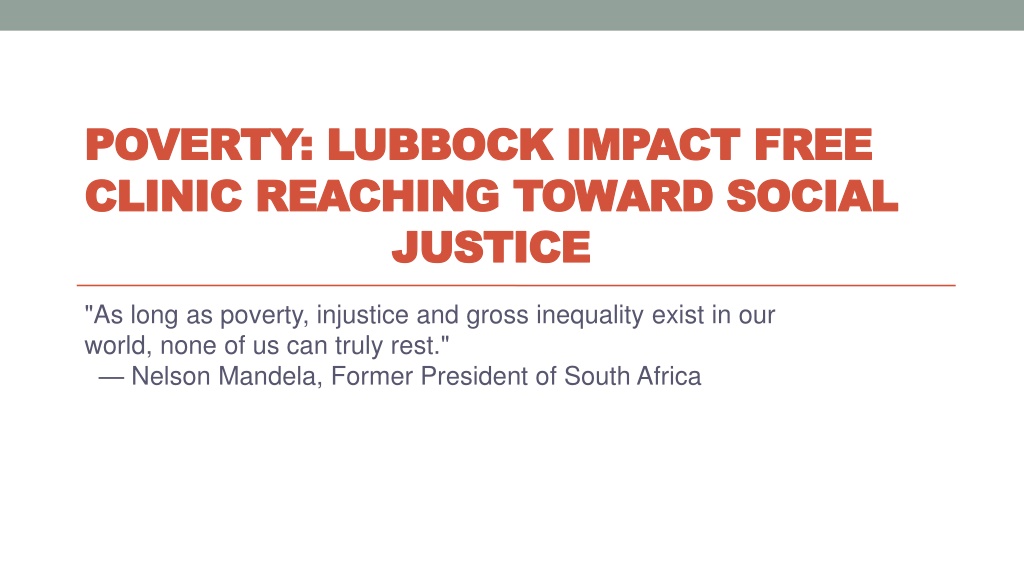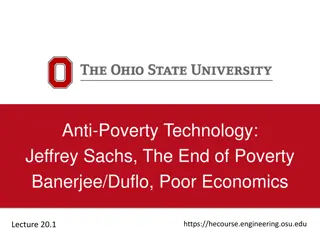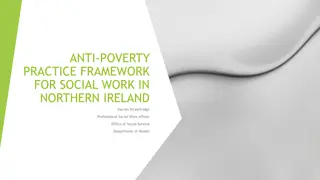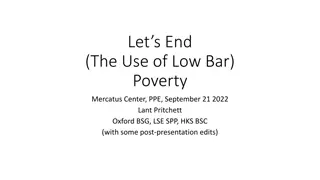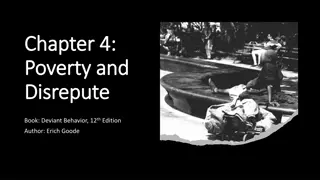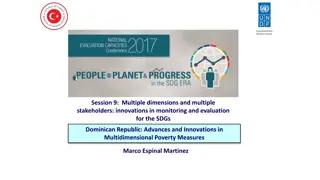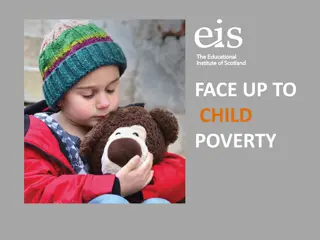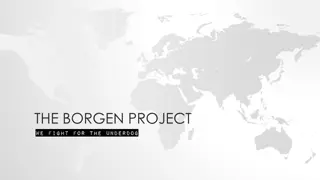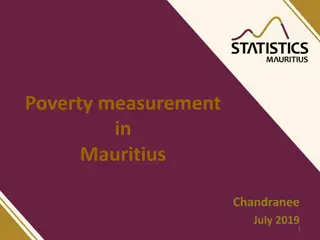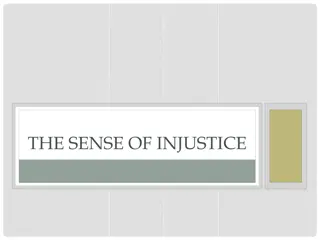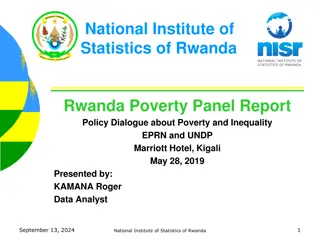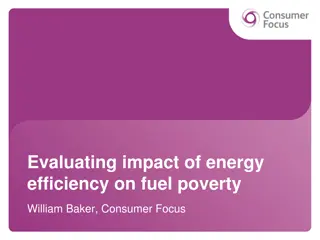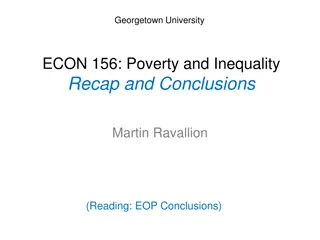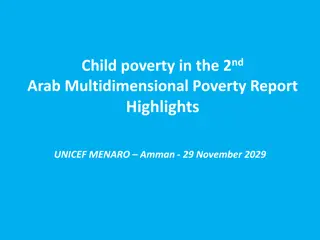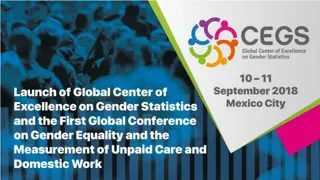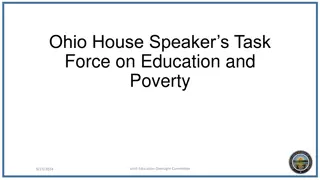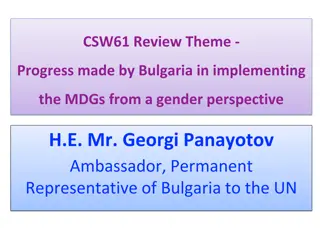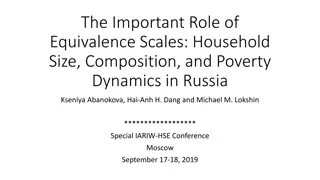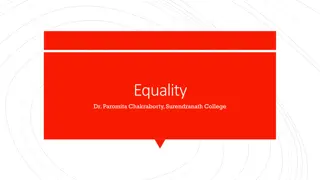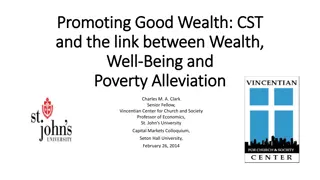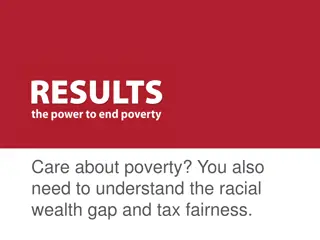Understanding Poverty: Impact, Injustice, and Equality
Exploring the multifaceted nature of poverty, this content delves into the impact of poverty on individuals in America, highlighting challenges faced like lack of access to basic services, healthcare, and financial resources. It also touches on societal attitudes towards poverty, emphasizing the need for social justice and equality. Quotes from Nelson Mandela and the Bible underscore the moral imperative to address poverty and advocate for just and compassionate actions.
Download Presentation

Please find below an Image/Link to download the presentation.
The content on the website is provided AS IS for your information and personal use only. It may not be sold, licensed, or shared on other websites without obtaining consent from the author. Download presentation by click this link. If you encounter any issues during the download, it is possible that the publisher has removed the file from their server.
E N D
Presentation Transcript
POVERTY: LUBBOCK IMPACT FREE POVERTY: LUBBOCK IMPACT FREE CLINIC REACHING TOWARD SOCIAL CLINIC REACHING TOWARD SOCIAL JUSTICE JUSTICE "As long as poverty, injustice and gross inequality exist in our world, none of us can truly rest." Nelson Mandela, Former President of South Africa
What does the Bible Say? No, the Lord has told us what is good. What he requires of us is this: to do what is just, to show constant love, and to live in humble fellowship with our God. (Micah 6:8)
Working in America If you're denied a checking account, there's no way for you to avoid paying a fee to cash a paycheck. If you need to buy a car to get to work, you'll have to accept whatever higher interest rate you're offered Growing up really poor means realizing in your twenties that Mommy was lying when she said she already ate
Working in America You can't pay for health insurance, and instead buy medicine from pet stores, I buy "fish" antibiotics online because I can't afford health care. Amoxicillin and such. Mostly for husband who has Lyme's disease. We can't afford our monthly health care rates. We are 30somethings in the US. Really feel like a "bottom feeder".
Poverty Whats Being Said in 2017? Narratives Don t worry, the neighbors are really nice and they won t think anything about your furniture No one should be fat, not even poor people poverty is no excuse. Even in the ghetto you can walk on the street and work out.
Microaggressions of Poverty Microaggressions - everyday verbal, nonverbal and environmental slights, snubs, or insults [that] communicate hostile, derogatory or negative messages about the individual based on their marginalized group identity (Sue 2010, p. 3).
Macroaggressions of Poverty Macroaggressions Occur at a structural level encompass actions that are meant to exclude, either by action or omission purposeful and deliberate verbal or non verbal communications meant to create longitudinally debilitating and depressive results in the victim (Osanloo, Boske, & Newcomb, 2016)
What Does the Bible Say? Suppose there are brothers or sisters who need clothes and don t have enough to eat. What good is there in your saying to them, God bless you! Keep warm and eat well! if you don t give them the necessities of life? (James 2:15-16)
Lubbock Impact Began in 2007 To transform lives, renew minds and educate families Services provided at Lubbock Impact - Wednesdays Food vouchers Emergency pantry Clothes Closet Hot meal Children/youth mentor programs Adult Bible Study and Worship Free medical Clinic
Lubbock Impact How many people served each week Over 300 meals served each Wednesday More than 50 people are helped through the emergency pantry An average of 30 patients are seen in the Free Medical Clinic At least 25 patients seek social work services
Medical Clinic TTUHSC at Lubbock Impact History of medical clinic Who serves in the Med clinic (doctors, nurses, pharm, social workers) Diverse group: Pre-med and medical students, nursing students, pharmacy students undergraduate social work students 2ndyear med students leadership team ensures smooth running of the medical clinic Social work faculty train undergraduate social work students in interviewing and documentation skills. Master Social Work students sometimes help out
MEDICAL CLINIC @ LUBBOCK IMPACT Provides services to adults 18 and older Services provided through the medical clinic Numerous medical issues Lab services and X-rays Pharmacy: antibiotics, high blood pressure, insulin, asthma inhalers, and various other medications NO NARCOTICS Dental Services: extractions and X-rays Social Work: referrals to various community resources, information regarding health insurances Numbers served in the medical clinic
Social work research @ the medical clinic Faculty and research assistant brainstormed the study IRB collected data and here we are Why do people come to the free clinic How best to train social work students to work with people who live in or near the poverty line
What drives Social worker view of poverty What are the main roles of social services agencies in providing services to people living in poverty? Societal perceptions of poverty are defined by political climate
What drives Social worker views of poverty Workers view of poverty shaped by individual and cultural images of poverty What is their experience? Ideas about those who live in poverty Individualistic/conservative explanation Structural explanation
Training social workers to understand poverty Knowledge of the aspects and effects of poverty in undergraduate classes through service learning is a better way to expose them to the realities of the experiences of living in poverty obtaining health care in poverty I, the Lord, command you to do what is just and right. Protect the person who is being cheated from the one who is cheating him. Do not ill-treat or oppress foreigners, orphans, or widows; and do not kill innocent people in this holy place. (Jeremiah 22:3)
Addressing the Problem A. How to address the problem: a. Banking concept vs. problem solving (Freire) i. Banking Concept paternalist action doing to 1.Could just give resources no follow up b. Problem posing integrating, and incorporating marginalized people into a healthy society i. Opportunity for authentic thinking that is concerned with reality and action
Questions from ATP Scale Some poor people live better than I do, considering all their benefits. I would support a program that resulted in higher taxes to support social programs for poor people.
Qualitative Questions & Quotes: Social Work Students Tell us about anything that you learned working at the Free Clinic. I learned about the resources that Lubbock has available to offer the poor and homeless community as well as got experience on not taking about visits. The majority of people there needed health care because they could not get insurance or Medicare because of their current economic situation. These people needed jobs, but more than that, they needed the ones they support to have jobs . I learned to be open-minded when working with the poor population instead of making assumptions of their situation.
Qualitative Questions & Quotes: Social Work Students Tell us about anything that you learned working at the Free Clinic. I learned to be more open minded when working with the poor population instead of making assumptions of their situations .
Qualitative Questions & Quotes Describe anything you found rewarding at the Free Clinic. I found it rewarding to work with the lower class population because I learned a lot more about them and their values. A lot of them were very grateful and thankful for our help which means a lot to me to be able to do that. SW Student I found it very rewarding to be able to help people in need, even if I wasn t able to do much, I was able to work with them and come up with solutions to try and fix their difficult situations and to better their lives. SW Student
Qualitative Questions & Quotes Describe anything you found rewarding at the Free Clinic. The pride you get from knowing that you could help someone . What I found rewarding from the Free Clinic was the Thank you I received from the majority of clients. A simple compliment of thank you does go a long way . I appreciated hearing about people s survival and coping techniques. It reinforced my belief in the strength of people .
Qualitative Questions & Quotes Describe anything you found rewarding at the Free Clinic. Being able to help people feel less confused about a certain situation was always rewarding. There were also a few nights when we opened the food pantry for emergencies and that always felt very good .
Qualitative Questions & Quotes Describe anything you found rewarding at the Free Clinic. Some clients kept to themselves and do not want to discuss their situation were harder to find out exactly what they were looking for . Some of the clients clearly did not want help or they thought we could solve all their problems for them without them doing the work. There was also some language barriers that proved to be trying at times . I found it challenging at times that I couldn t do more to help people. Sometimes all they needed was a source of transportation or some money to get a new ID to go to a job interviews and doctor appointments and we couldn t do much a lot of times and that was hard for me .
Qualitative Questions & Quotes How do you believe the Free Clinic service will benefit your career? I got a glimpse into the medical social work field and learned about a lot of resources that Lubbock has to offer the poor people in the area. SW Student I was able to get a better understanding of social programs and that will be incredibly beneficial in my future career. It also helped me to be more confident in interviewing clients. SW Student
Qualitative Questions & Quotes How do you believe the Free Clinic service will benefit your career? I believe the free Clinic will benefit my career by understanding that people have different situations that prevent themselves from furthering themselves in their lives . It gave me a better understanding of clients who are less fortunate and do not have health insurance. It really opened up my mind more allowing me to see poor people in a different way .
What Can We do? Understanding our own concept of money and poverty Understand the narratives of those who are less fortunate Advocate to develop policies that Prohibit payday loans Predatory practices Ban the Box Fair Chance Act
Conclusion A. Summary of the free clinic B. Summary of the study C. Questions, comments, suggestions The pursuit of full humanity, however, cannot be carried out in isolation or individualism, but only in fellowship and solidarity; Paulo Freire, Pedagogy of the Oppressed
Social Justice: Matthew 25: 39-40 Then the righteous will answer him, Lord, when did we see you hungry and feed you, or thirsty and give you something to drink? 38 When did we see you a stranger and invite you in, or needing clothes and clothe you? 39 When did we see you sick or in prison and go to visit you? 40 The King will reply, Truly I tell you, whatever you did for one of the least of these brothers and sisters of mine, you did for me
References Cozzareli, C., Wilkinson, A.V., & Tagler, M.J. (2001). Attitudes toward the poor and attributions for poverty. Journal of Social Issues, 57(2), 207-227. Freire, P. (1968, 2000). Pedagogy of the oppressed: 30th anniversary. New York: Bloomsbury Academics. Kaiser Foundation, The Henry J. (2015, October). Key facts about the uninsured population [Fact Sheet]. Retrieved from: www.kff.org National Association of Social Workers. (2008). Code of ethics of the National Association of Social Workers. Retrieved from http://www.naswdc.org/pubs/code/code.asp Sanders, S., McFarland, P., & Sunday, J. (2003). The impact of cross-cultural service-learning on undergraduate social work students perceptions of culture, race and economic justice. The Journal of Baccalaureate Social Work, 9(1), 19-40. Smith-Campbell, B. (2005). Health professional students cultural competence and attitudes toward the poor: The influence of a clinical practicum supported by the National Health Service Corps. Journal of Allied Health, 34(1), 56-62. Texas Tech University. (2015). Service learning. Retrieved (12/15/2015), from https://www.depts.ttu.edu/calue/servicelearning.php Weiss-Gal, I., Benyamini, Y., Ginzburg, K., Savaya, R., & Peled. E. (2009). Social workers and service users causal attributions for poverty. National Association of Social Workers, 54(2), 125-133. Weaver, R. D., & Yun, S. H. (2011). Analyzing the attitude of undergraduate students toward poverty and impoverished persons: Does social work education make a difference? Journal of Teaching in Social Work, 31(1), 3-20. DOI: 10.1080/08841233.2011.539125 Weiss-Gal, I., Benyamini, Y., Ginzburg, K., Savaya, R., & Peled, E. (2009). Social workers and service users causal attributions for poverty. National Association of Social Workers, 54(2), 125-133. Yun, S. H., & Weaver, R.D. (2010). Development and validation of a short form of the attitude toward poverty scale. Advances in Social Work, 11(2), 174-187.
